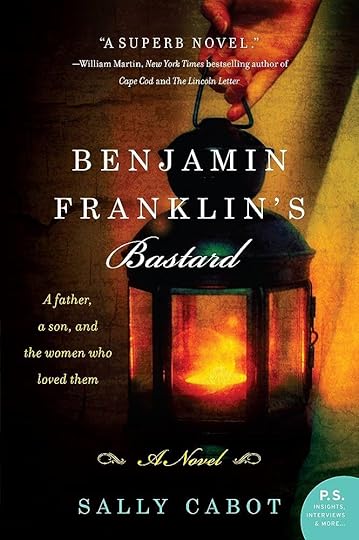Review: Benjamin Franklin’s Bastard by Sally Cabot

Benjamin Franklin’s Bastard by Sally Cabot begins in 1730s Philadelphia with Deborah Read meeting Benjamin Franklin. Their brief courtship is cut short when Franklin journeys to London for a time. When he returns, he meets a tavern serving girl named Anne. While Deborah and Benjamin are obviously historical figures, Anne is not. Rather, she is a creation of the author since history has not recorded the true name and background of the mother of Franklin’s “illegitimate” son, William.
Since Anne cannot provide a financially stable life for William, she warily hands him off to Benjamin to raise with his new “wife,” Deborah. I say wife in quotations because Deborah and Benjamin were never legally married–she later, after seven years, became his common law life. The reasoning behind this action was that Deborah had previously been married, but her first husband abandoned her without giving her a proper divorce. She (and many women of that time in that situation) was essentially stuck in a social no-(wo)man’s land in that she could not legally marry another (and thus be provided for.) That said, it is still quite remarkable and speaks to Franklin’s unique personality that he wanted Deborah to live with him as his wife without the legal marriage. Adding to his personality, Cabot details Franklin’s many experiments, personal educational endeavors, and a mind that certainly marched to the beat of his own drum. Franklin says many times in the novel something to the effect of, “I am a monogamous being, not celibate” – which accounts for his ongoing relations with Anne even after his “marriage” to Deborah.
I thoroughly enjoy Anne’s pov chapters, as they reminded me of Emma Donaghue’s Slammerkin, which is one of my favorite books. The author also had more creative license with this character since she was a fabrication. Although Anne is perceived by many as “low” and a street whore, she is clever and business-savvy, as well as able to find to ways see William while navigating Deborah’s ever-watchful presence. Although, the reader fully feels Deborah’s resentment toward her husband, step-child, and the tide in which her husband’s life carries her, as well as her feelings of inadequacy against her brilliant husband’s intellect and accomplishments.
Franklin, like many other “Founding Fathers,” is complex. On a public level he was an inventor, political advocate, etc., but in his personal life he was at odds with those closest to him.
My only qualm with this novel is that is moved very fast in too short a count of pages, spanning 1730 – 1777, with many years and major events glossed over.



